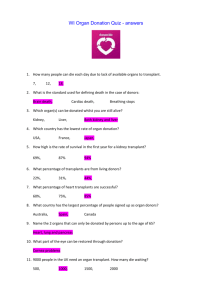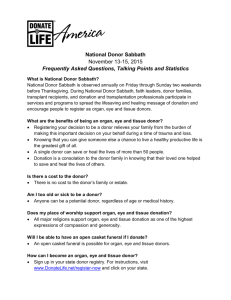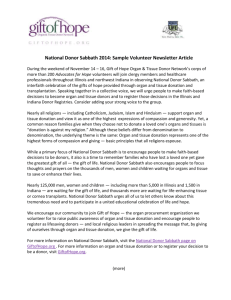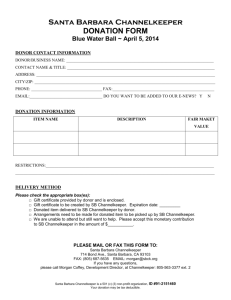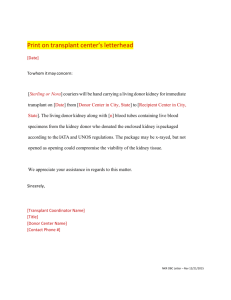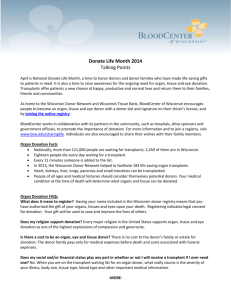FAQs talking points Statistics
advertisement
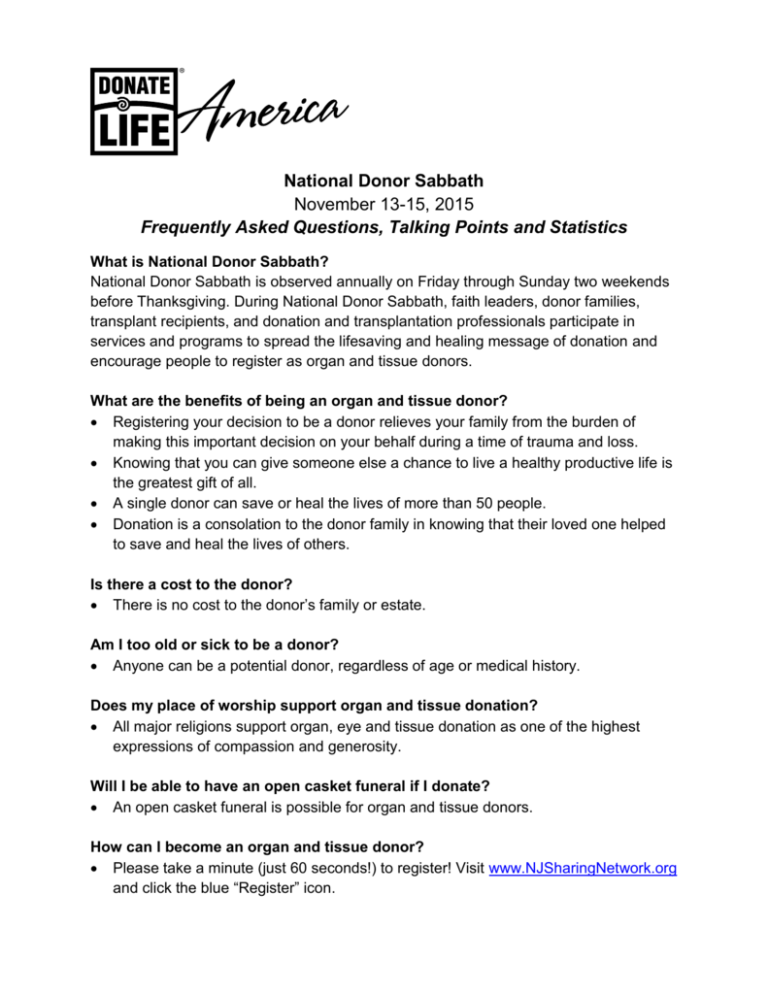
National Donor Sabbath November 13-15, 2015 Frequently Asked Questions, Talking Points and Statistics What is National Donor Sabbath? National Donor Sabbath is observed annually on Friday through Sunday two weekends before Thanksgiving. During National Donor Sabbath, faith leaders, donor families, transplant recipients, and donation and transplantation professionals participate in services and programs to spread the lifesaving and healing message of donation and encourage people to register as organ and tissue donors. What are the benefits of being an organ and tissue donor? Registering your decision to be a donor relieves your family from the burden of making this important decision on your behalf during a time of trauma and loss. Knowing that you can give someone else a chance to live a healthy productive life is the greatest gift of all. A single donor can save or heal the lives of more than 50 people. Donation is a consolation to the donor family in knowing that their loved one helped to save and heal the lives of others. Is there a cost to the donor? There is no cost to the donor’s family or estate. Am I too old or sick to be a donor? Anyone can be a potential donor, regardless of age or medical history. Does my place of worship support organ and tissue donation? All major religions support organ, eye and tissue donation as one of the highest expressions of compassion and generosity. Will I be able to have an open casket funeral if I donate? An open casket funeral is possible for organ and tissue donors. How can I become an organ and tissue donor? Please take a minute (just 60 seconds!) to register! Visit www.NJSharingNetwork.org and click the blue “Register” icon. It is important to share your decision with family members that you have decided to sign up as a donor so that they can support your decision. Have the conversation! What can I do to increase organ, eye and tissue donation in my community? Tell your family and friends about your decision to Donate Life. Ask them to get the facts, and consider registering as donors. Go to www.NJSharingNetwork.org for tips and tools for educating members of your community about the lifesaving gift of organ and tissue donation. General Donation and Transplantation Statistics More than 29,500 patients began new lives in 2014 thanks to organ transplants (about 81 every day). _________________________________________________________________________________________________________ Over 120,000 people in the U.S. are currently waiting for an organ transplant. More than 1,200 of them are 10 years old or younger. Nearly 60% of patients awaiting lifesaving transplants are minorities. On average, 150 people are added to the nation’s organ transplant waiting list each day—one every 10 minutes. Sadly, on average, 21 people die each day because the organs they need are not donated in time. _________________________________________________________________________________________________________ A living donor can save a life by donating a kidney or a portion of their liver, lung, pancreas or intestine. More than one third of all deceased donors are age 50 or older; more than 7% are age 65 or older. _________________________________________________________________________________________________________ Each year, there are approximately 30,000 tissue donors and more than 1 million tissue transplants performed and the surgical need for tissue is rising steadily. A single tissue donor can save or heal up to 50 people. _________________________________________________________________________________________________________ Nearly 50,000 patients have their sight restored through corneal transplants each year. _________________________________________________________________________________________________________ To register as a lifesaving and healing donor, visit www.NJSharingNetwork.org and click the blue “Register” icon. Statistics from Organ Procurement and Transplantation Network as of August 10, 2015
